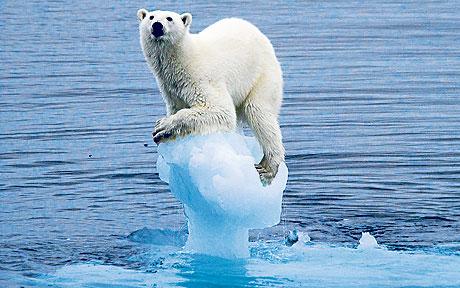The military must do more to prepare for the impacts of a changing climate, including updating war plans and building more ships to operate in the Arctic, a report by a group of retired military officers will say Wednesday.
The report by CNA Corp., a nonprofit research group that frequently does work for the Navy, says the military must be more aggressive as it prepares to deal with everything from increased numbers of natural disasters in the Pacific to expanded shipping in the Arctic.
“Politically charged debate has silenced sound public discourse,” the group said, adding “we believe that congressional action is warranted — and it is needed now.” Taking aim at those who have criticized the Pentagon under the Obama administration for making energy and climate change core concerns for the Defense Dept., the officers said that “political concerns and budgetary limitations cannot be allowed to dominate what is essentially a salient national security concern for our nation.”
The report highlights a number of worries about the security impacts of climate change that have gone from hypothetical to happening. That includes the rapid opening of the Arctic Ocean–where neither the United States nor the rest of the international community is prepared for the pace of change, the report notes– drought and water stresses that drive instability in already shaky parts of the world, and the threat to the U.S. military’s domestic bases and installations from extreme weather and rising sea levels.
The dire predictions come just a week after Pentagon officials and a bevy of former high-ranking officers, some of whom are also on the advisory board, said that the Obama administration’s latest National Climate Assessment underscored the here-and-now threats that climate change poses to U.S. security.
One example of the way that climate change is helping create fresh security headaches is found in Mali, the report says. The triple whammy of climate change, desertification, and resulting ethnic tension overwhelmed the Malian government in recent years. As a result, Al Qaeda in the Islamic Maghreb, an offshoot off the terror group that had once been confined to North Africa, took over the northern part of the country, where it remains today.
Another way in which climate change is shaping the military’s mission, the report said, is found in the Asia-Pacific region. Stronger and more frequent storms, coupled with densely populated coastlines, are turning natural-disaster response into a core part of U.S. Pacific Command’s responsibilities, and becoming a crucial element of the U.S. military “rebalancing” to Asia. Joint humanitarian assistance and disaster response drills with Asian militaries are becoming part and parcel of the Pentagon’s pivot to Asia.
And that’s the easy part; “the volatile mixture of population growth, instability due to the growing influence of nonstate actors, and the inevitable competition over scarce resources will be multiplied and exaggerated by climate change,” the report said.
“I am afraid we will soon start getting into varsity-level instability,” retired Adm. David Titley, the first chair of the Navy’s task force on climate change, said in the report.
Among the members of the advisory board who signed off on the study, titled “National Security and the Accelerating Risks of Climate Change,” are former senior officers from the U.S. Army, Navy, Marines, and Air Force, as well as retired Royal Navy Adm. Neil Morisetti, recently the climate-change envoy for the British Foreign Secretary.
Agencies/Canadjournal
 Canada Journal – News of the World Articles and videos to bring you the biggest Canadian news stories from across the country every day
Canada Journal – News of the World Articles and videos to bring you the biggest Canadian news stories from across the country every day



